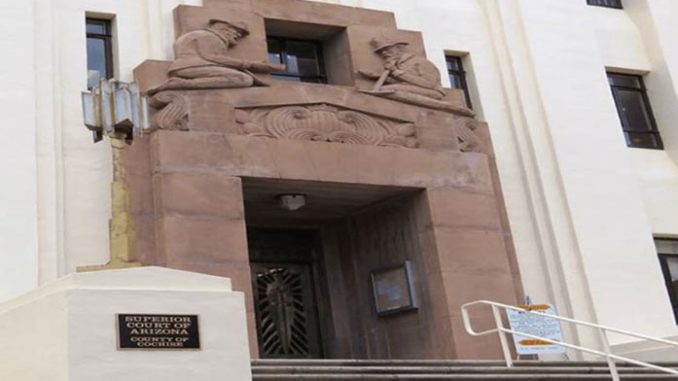
A Pima County woman who alleged deputies in Cochise County improperly stopped her vehicle and unlawfully searched her Tucson home based on a tip from an unidentified informant has dropped a legal challenge to her arrest in order to accept a prison-mandatory plea deal.
Gina Louisa Campbell will be formally sentenced March 14 to a six-year prison term after pleading guilty last week to a Class 3 felony of attempted transportation for sale of methamphetamine. She remains out of custody until sentencing.
Campbell, 34, arrived at Cochise County Superior Court on Feb. 10 for what was to be a hearing on a motion to suppress evidence seized from her vehicle during an April 2021 traffic stop. The U.S. Supreme Court has upheld a search and seizure in connection with an ordinary traffic stop, but an officer must first have “probable cause to believe that a traffic violation has occurred.”
The motion to suppress filed by defense attorney Nicholas W. Brereton argued the claims by deputies with the Cochise County Sheriff’s Office (CCSO) that Campbell violated traffic laws “are simply not credible.” The motion also challenged a K9’s alert on Campbell’s car as further reason to suppress any evidence found in the car.
But Judge Timothy Dickerson never had the chance to rule on the motion. Instead, he was advised by Brereton that his client was prepared to accept a seven-page plea deal offered by Terisha Driggs of the Cochise County Attorney’s Office.
Dickerson accepted Campbell’s guilty plea, finding it “to be knowingly, intelligently, and voluntarily made.” With that, the motion to suppress was moot, as was another motion Brereton recently filed in an attempt to learn the identity of the informant.
Court records reveal a tip in early 2021 alleged Campbell was transporting meth into Cochise County, specifically the Sierra Vista area. In April 2021, CCSO deputies took part in surveillance of Campbell’s Tucson residence and on April 23 they surveilled Campbell as she drove to Sierra Vista, noting in a report that Campbell visited a home there “for approximately 30 minutes.”
The next day, the Sierra Vista Police Department received its own tip from an informant about drugs likely being sold from the same home that Campbell had been visited. Then on April 27, Campbell once again drove to Cochise County, not knowing she was under surveillance.
As she approached the Whetstone – Huachuca City area, Campbell’s vehicle was pulled over for a traffic violation for having a “large obstruction to the driver’s view” which turned out to be a mounted cellphone. During the traffic stop, a CCSO K9 already in the area reportedly alerted to Campbell’s vehicle, prompting a search which revealed a saleable quantity of meth and other drug paraphernalia.
The same day a search warrant was approved for Campbell’s Tucson home. That search led to the seizure of two firearms, drug paraphernalia, a security system, two cellphones, and a bag containing approximately two pounds of what officers believed was meth, but “the large amount of suspected contraband proved to not be methamphetamine or anything else illegal,” according to Brereton.
Campbell’s plea deal also leaves unresolved the identity of the informant, something Brereton sought to learn through a motion to compel the prosecutor to share the name.
“Who was the informant? Was this informant reliable? Ms. Campbell seeks identification of the informant’s identity, ability to observe and a measure of proof of reliability,” the motion argued. “As a material witness, the informant’s testimony would likely be critical to the establishment of reasonable doubt, and non-disclosure would deprive the defendant of a fair trial.”

